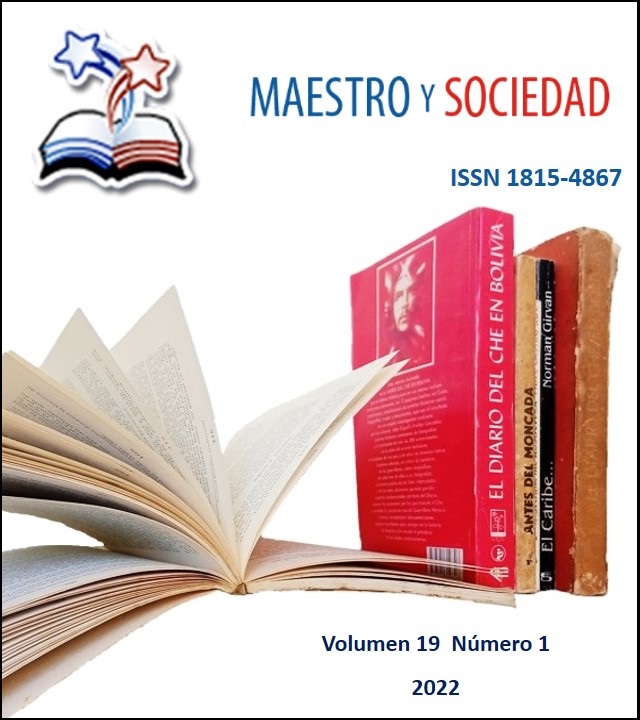Teacher digital illiteracy in the teaching-learning process of the San Carlos Educational Unit
Array
Keywords:
digital illiteracy, teaching-learning, teaching, TICsAbstract
The main objective of this article is to determine digital illiteracy to improve the teaching-learning process (PEA) of the San Carlos Educational Unit of the Quevedo canton. Through the adequate preparation of teaching staff in the field of TICs through an alternative training proposal, it is sought to maintain quality standards in knowledge and skills that are developed. Likewise, the following inductive and heuristic methods were used in which the importance of the use of TICs is recognized, which allows a dynamic and adjustable learning process, making it a pioneer in educational environments due to its great efficiency and interaction. Finally, the results of this research reflect that teachers should be trained in TICs since they lack digital literacy through the virtual classroom, reflective thinking, interactivity, tutor support, peer support and interpretation.
References
2. Baelo, R., & Arias, A. R. (2011). La formación de maestros en España, de la teoría a la práctica. Tendencias Pedagógicas, 18, 105–131.
3. Escalante, C. (2020). ¿Por qué la alfabetización digital es tan importante? | No te quedes atrás. https://ticnegocios.camaravalencia.com/servicios/tendencias/por-que-la-alfabetizacion-digital-es-tan-importante/
4. Fernández, A., & Cesteros, P. (n.d.). Las plataformas e-learning para la enseñanza y el aprendizaje universitario en Internet.
5. Fernández, D., Álvarez, Q., & Mariño, R. (2013). E-LEARNING: OTRA MANERA DE CASO PARTICULAR E-learning: another way of teaching and learning in a traditional presence-based university. A special case study. http://www.ugr.es/local/recfpro/rev173COL5.pdf
6. Jorge, D., & Martínez, C. (2016). Teorías subjetivas en profesores y su formación profesional*. 1–26. https://doi.org/10.1590/S1413-24782016216517
7. López, D. (2020). Analfabetismo digital: un fenómeno que solo se puede combatir en la escuela. https://theconversation.com/analfabetismo-digital-un-fenomeno-que-solo-se-puede-combatir-en-la-escuela-143931
8. López, R. (2020). E-learning: el futuro de la educación del diseño / E-learning: the future of design education.
9. Ministerio de Educaciòn. (2015). Página 1 de 116 REGLAMENTO GENERAL A LA LEY ORGÁNICA DE EDUCACIÓN INTERCULTURAL *.
10. Pérez, J. (2013). Analfabetismo digital | josé pérez lozano.
11. Pinilla, J. (2017). Aprendizaje colaborativo en el entorno virtual. 9. https://www.academia.edu/32211210/ESTRATEGIAS_DE_APRENDIZAJE_COLABORATIVO_AC_
12. Rivera, P., Alonso, C., & Sancho, J. (2017). Desde la educación a distancia al e-learning: emergencia, evolución y consolidación. Revista Educación y Tecnología, 1(10), 1–13. https://bit.ly/35Vo0gU
13. Rodríguez, H. (2017). Importancia de la formación de los docentes en las instituciones educativas. Universidad Autónoma Del Estado de Hidalgo .
14. Rosas, M. (2011). El analfabetismo digital | Ventana Política.
15. Sevilla, E. (2018, August). El Analfabetismo Digital – Inacorpsa del Ecuador S.A.
16. Yirda, A. (2021). ¿Qué es Digital? » Su Definición y Significado [2021]. https://conceptodefinicion.de/digital/
Published
How to Cite
Issue
Section
License
This journal provides immediate open access to its content, based on the principle that offering the public free access to research helps a greater global exchange of knowledge. Each author is responsible for the content of each of their articles.



























 Universidad de Oriente
Universidad de Oriente 